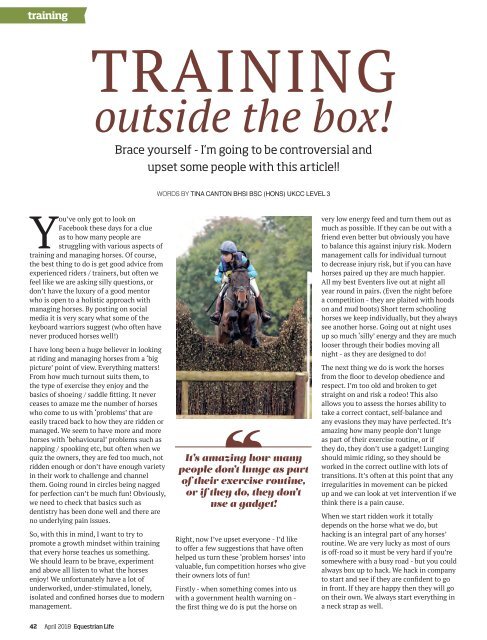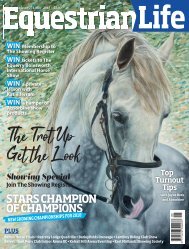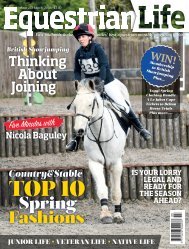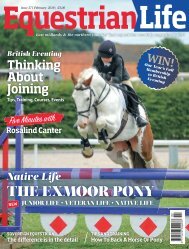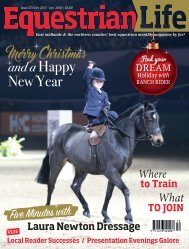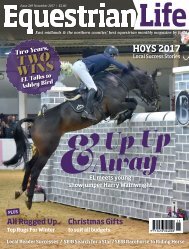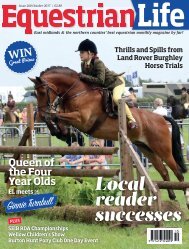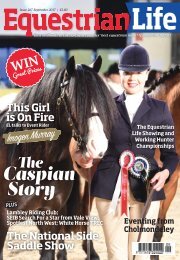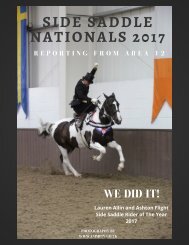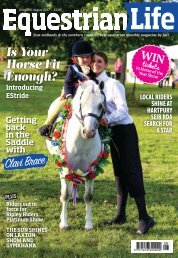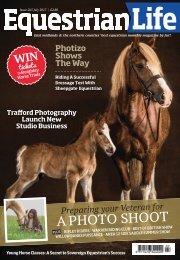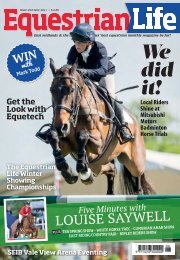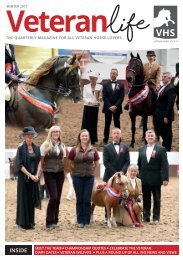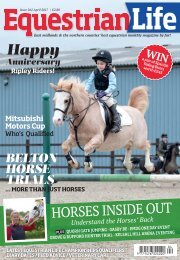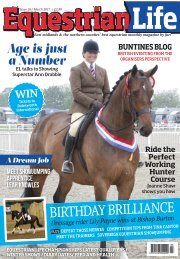Equestrian Life April 2018 Issue
Your leading monthly magazine for all horse lovers and riders
Your leading monthly magazine for all horse lovers and riders
You also want an ePaper? Increase the reach of your titles
YUMPU automatically turns print PDFs into web optimized ePapers that Google loves.
training<br />
TRAINING<br />
outside the box!<br />
Brace yourself - I’m going to be controversial and<br />
upset some people with this article!!<br />
WORDS BY TINA CANTON BHSI BSC (HONS) UKCC LEVEL 3<br />
You’ve only got to look on<br />
Facebook these days for a clue<br />
as to how many people are<br />
struggling with various aspects of<br />
training and managing horses. Of course,<br />
the best thing to do is get good advice from<br />
experienced riders / trainers, but often we<br />
feel like we are asking silly questions, or<br />
don’t have the luxury of a good mentor<br />
who is open to a holistic approach with<br />
managing horses. By posting on social<br />
media it is very scary what some of the<br />
keyboard warriors suggest (who often have<br />
never produced horses well!)<br />
I have long been a huge believer in looking<br />
at riding and managing horses from a ‘big<br />
picture’ point of view. Everything matters!<br />
From how much turnout suits them, to<br />
the type of exercise they enjoy and the<br />
basics of shoeing / saddle fitting. It never<br />
ceases to amaze me the number of horses<br />
who come to us with ‘problems’ that are<br />
easily traced back to how they are ridden or<br />
managed. We seem to have more and more<br />
horses with ‘behavioural’ problems such as<br />
napping / spooking etc, but often when we<br />
quiz the owners, they are fed too much, not<br />
ridden enough or don’t have enough variety<br />
in their work to challenge and channel<br />
them. Going round in circles being nagged<br />
for perfection can’t be much fun! Obviously,<br />
we need to check that basics such as<br />
dentistry has been done well and there are<br />
no underlying pain issues.<br />
So, with this in mind, I want to try to<br />
promote a growth mindset within training<br />
that every horse teaches us something.<br />
We should learn to be brave, experiment<br />
and above all listen to what the horses<br />
enjoy! We unfortunately have a lot of<br />
underworked, under-stimulated, lonely,<br />
isolated and confined horses due to modern<br />
management.<br />
It’s amazing how many<br />
people don’t lunge as part<br />
of their exercise routine,<br />
or if they do, they don’t<br />
use a gadget!<br />
Right, now I’ve upset everyone - I’d like<br />
to offer a few suggestions that have often<br />
helped us turn these ‘problem horses’ into<br />
valuable, fun competition horses who give<br />
their owners lots of fun!<br />
Firstly - when something comes into us<br />
with a government health warning on -<br />
the first thing we do is put the horse on<br />
very low energy feed and turn them out as<br />
much as possible. If they can be out with a<br />
friend even better but obviously you have<br />
to balance this against injury risk. Modern<br />
management calls for individual turnout<br />
to decrease injury risk, but if you can have<br />
horses paired up they are much happier.<br />
All my best Eventers live out at night all<br />
year round in pairs. (Even the night before<br />
a competition - they are plaited with hoods<br />
on and mud boots) Short term schooling<br />
horses we keep individually, but they always<br />
see another horse. Going out at night uses<br />
up so much ‘silly’ energy and they are much<br />
looser through their bodies moving all<br />
night - as they are designed to do!<br />
The next thing we do is work the horses<br />
from the floor to develop obedience and<br />
respect. I’m too old and broken to get<br />
straight on and risk a rodeo! This also<br />
allows you to assess the horses ability to<br />
take a correct contact, self-balance and<br />
any evasions they may have perfected. It’s<br />
amazing how many people don’t lunge<br />
as part of their exercise routine, or if<br />
they do, they don’t use a gadget! Lunging<br />
should mimic riding, so they should be<br />
worked in the correct outline with lots of<br />
transitions. It’s often at this point that any<br />
irregularities in movement can be picked<br />
up and we can look at vet intervention if we<br />
think there is a pain cause.<br />
When we start ridden work it totally<br />
depends on the horse what we do, but<br />
hacking is an integral part of any horses’<br />
routine. We are very lucky as most of ours<br />
is off-road so it must be very hard if you’re<br />
somewhere with a busy road - but you could<br />
always box up to hack. We hack in company<br />
to start and see if they are confident to go<br />
in front. If they are happy then they will go<br />
on their own. We always start everything in<br />
a neck strap as well.<br />
42 <strong>April</strong> <strong>2018</strong> <strong>Equestrian</strong> <strong>Life</strong>


